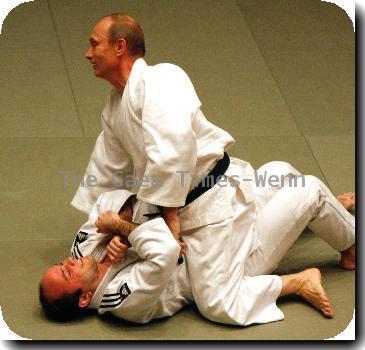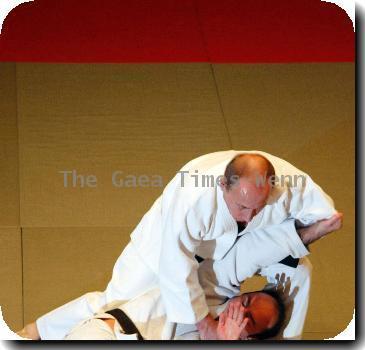Putin says Moscow bombing masterminds will be dragged ‘out of the sewer’ to justice
By Lynn Berry, APTuesday, March 30, 2010
Putin talks tough after Moscow subway bombings
MOSCOW — The old Vladimir Putin is back, confronting a terrorist attack in Moscow by using the same kind of coarse and colorful language that helped him win the presidency a decade ago.
A day after twin suicide bombings in the subway that killed 39 people, the powerful prime minister told Russians that he is certain the masterminds of the attacks would be found. The security services have blamed extremists from the North Caucasus, a predominantly Muslim region in southern Russia that includes Chechnya.
“We know they are lying low, but it is already a matter of pride for the law enforcement agencies to drag them out of the sewer and into broad daylight,” Putin said, directing a transportation security meeting that was shown on Russian television Tuesday.
The choice of the gutter language recalled Putin’s famous threat to “wipe out the Chechen rebels in the outhouse” after they were blamed for a series of apartment building bombings that terrorized Moscow in 1999.
Putin, as prime minister at the time, sent in overwhelming military force to pound the region into submission and was elected president the following year.
Now in his second stint as prime minister after serving two full terms as president, Putin has an excuse to revert to the tough line that shored up his authority following past terrorist attacks. While welcomed by many Russians, it also is raising fears that civil liberties may be further sacrificed under the pretext of fighting terrorism.
Capitalizing on the outrage, members of the Kremlin-loyal parliament proposed bringing back the death penalty for terrorism. Russia has imposed a moratorium on capital punishment, but has been reluctant to outlaw it due to broad public support for the death penalty.
Monday’s subway bombings, carried out by two women, are the first terrorist attacks in Moscow in six years. They have shaken a city that has been insulated from the violence still raging in the restive southern corner of the country.
Russia observed a day of mourning Tuesday, with flags at half-staff at the Kremlin and across the vast country. Relatives identified the dead at a Moscow morgue, and tearful commuters placed candles at makeshift memorials heaped with carnations inside the two stricken subway stations in the city center.
Heightened transportation security remained in effect across the capital and elsewhere. Police with machine guns and dogs patrolled subway entrances.
The attacks signaled to Russians that they are no safer than they were before Putin came to power.
No one has claimed responsibility for the attacks, but many speculated that they were retaliation for the recent killings of Islamic militant leaders in the North Caucasus, including one known for training suicide bombers.
Putin used a string of terrorist attacks in 2004 to consolidate his power further. He abolished gubernatorial elections, effectively giving the Kremlin the power to appoint governors, and pushed his liberal critics out of parliament. Since then the political opposition has been fully marginalized.
Many opposition leaders and rights activists said they feared the subway bombings would be a convenient excuse for the government to put increased pressure on the opposition, perhaps by cracking down even harder on street protests.
“Our government loves to use such events to act as they want,” Lyudmila Alexeyeva, a veteran human rights activist, wrote in her blog. “So this is an excellent opportunity to further limit our constitutional freedoms, pretending they care about our security.”
Lidia Yusupova, a Chechen rights activist, was more alarmist.
“The system will have its hands untied completely,” she told The Associated Press. “There will be a crackdown on all walks of life. We have no rights now, but we will have even fewer soon.”
While Putin appears eager to meet the challenge the attacks have posed to his rule and reassure Russians the situation is under control, he has so far shown no inclination to impose harsh, new measures. And it is not at all clear what more the government could do.
In the North Caucasus, the security services and police have been ordered to step up their campaign to eliminate the leaders of the Islamic insurgency, seen by many Muscovites as the right response to the attacks.
“This is the revenge of the Chechens,” said Yekaterina Afanasyeva, a 26-year-old nurse who nervously rode the metro Tuesday. “We should carry on with a very tough policy in the Caucasus, probably even tougher. Nothing of the kind would have been possible under a dictatorship.”
But the attacks have also given new impetus to President Dmitry Medvedev’s efforts to address the root causes of the terrorism in the Caucasus, where deep poverty, rampant corruption and heavy-handed tactics by security forces have provided fertile ground for Islamic militants.
In discussing the situation Tuesday with his human rights adviser, Ella Pamfilova, Medvedev said improving the standard of living will be more difficult than ridding the region of terrorists.
“It’s more difficult to create the right modern conditions for education and conducting business, to fight the clan structure that has evolved in the Caucasus for many centuries, and unmeasurable corruption,” Medvedev said.
In his partnership with Putin, Medvedev remains the junior partner and has been assigned the role of modernizer. And he has little to show for his efforts.
Many say the Kremlin can no longer ignore the social and economic problems of its southern fringe.
“The question is whether there will be accomplishments with social development to give people an alternative to blowing themselves up,” said Sam Greene, a political analyst with the Carnegie Moscow Center.
_____
Associated Press writers David Nowak, Mansur Mirovalev and Nataliya Vasilyeva contributed to this report.
Tags: Bombings, Dead, Eastern Europe, Europe, Moscow, Political Activism, Political Issues, Russia, Terrorism, Vladimir Putin

